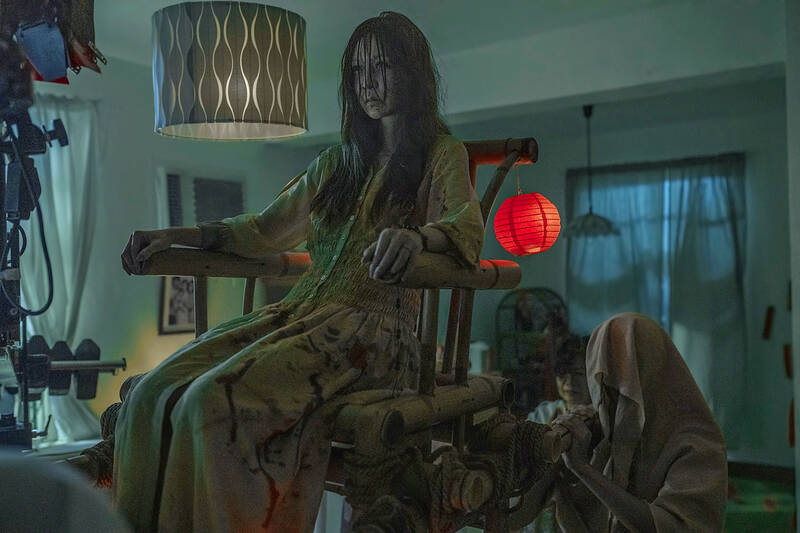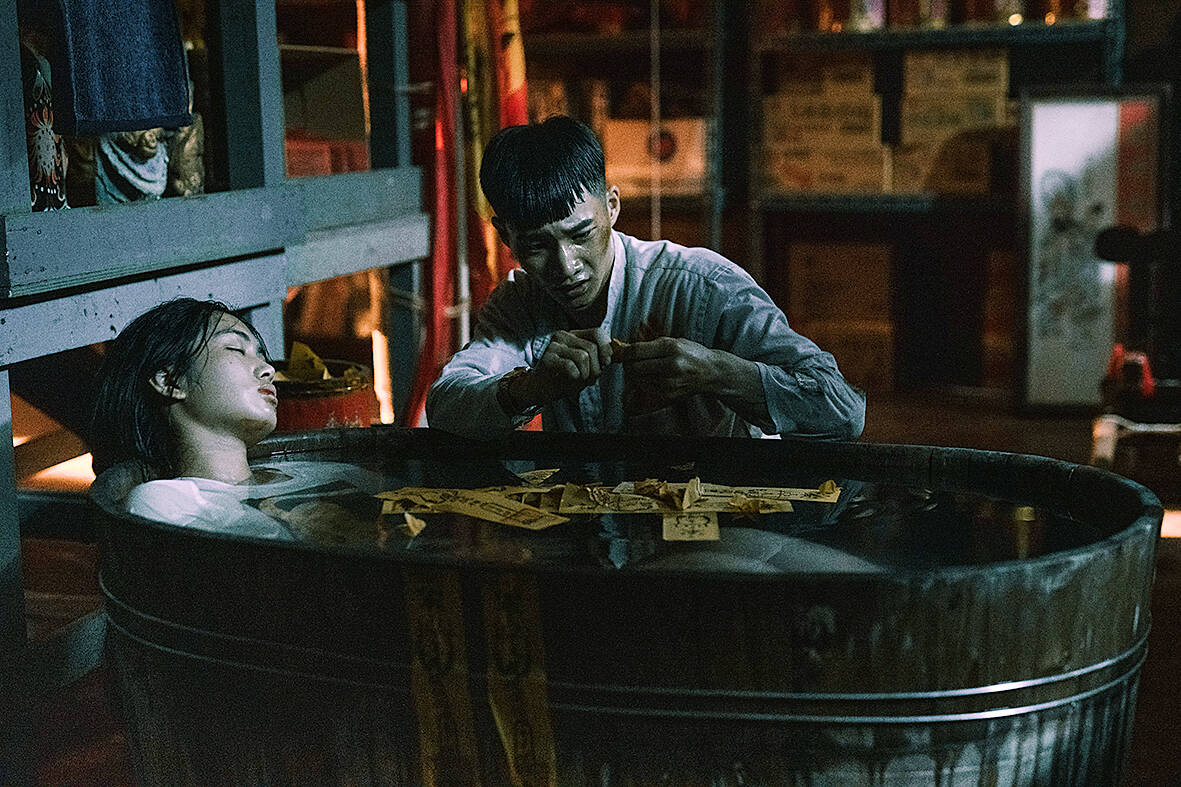Opening with a visually striking scene of a woman (Vicky Tseng, 曾莞婷) visiting an insidious cult with the hope they will bring her child back to life, Antikalpa’s rapid descent into a cheesy teenage occult drama is probably the most terrifying part of the film.
The rest of the movie follows Ah-dai (Huang Kuan-chih, 黃冠智), an awkward high schooler with a magical “cursed arm” who reluctantly trains to take over his father’s Taoist temple. His sole purpose in life seems to be capturing the attention of his classmate Wang Yu-fan (Regina Lei, 雷嘉汭) — whose name he repeats in the film ad nauseam — even willing to steal the temple’s goddess effigy (who’s also his godmother) to help her conduct a forbidden huajie (化劫) ceremony to bring her missing aunt back to life. The caveat is that if the wish is granted, a hefty price will be enacted.
Never mind how a regular teenage girl would know how to conduct such a frightening and complex ceremony, she also seems to have a history of being possessed by evil spirit, seriously wounding Ah-dai in an incident a year earlier that’s never fully explained. Ah-dai was only saved by his powerful Taoist priestess mother (Sara Yu, 于子育), who ends up mysteriously leaving home due to the event that gave him the “cursed arm.”

Photo courtesy of A Really Happy Film
Why Yu-fan would find it safe to venture into the paranormal again is mind-boggling, but let’s just chalk both characters’ behavior up to teenage impulsiveness. Rounding out the trio is Xiao-pang (Troy Liu, 劉子銓), who seems to do little more than zealously try to play matchmaker to Ah-dai and Yu-fan.
Risking one’s life to save a loved one is one thing, especially if they somehow feel responsible, but a few of the trio’s comically thuggish karate teammates force themselves into the ritual with bland wishes such as “get me out of this damned town.” Surely you don’t need to go as far as pray to an evil deity to accomplish that.
Of course the truth behind their intrusion is more nefarious and the ritual goes horribly wrong. Ah-dai is forced to play hero (with the help of his parents) to save the damsel in distress and win her love by, um, “never letting go” a la Titanic.

Photo courtesy of A Really Happy Film
The story certainly has a B-movie feel to it, which can still be entertaining — no matter how muddled and cliched — if it were actually scary. But after the ominous first scene, the rest of the film feels more like a gory video game where you pretty much know when the monsters will appear and how to defeat them. At least give us a jump scare or two.
This movie tries to bank on the successful trend of Taiwanese folk culture-based horror, but unfortunately, it explains essentially nothing about the ritual’s origins nor lore. How did an Earth God Temple transform into a “yin” temple (陰廟, which are supposedly without deities) hell bent on sacrificing people to a demon? How does one get a cursed arm?
There’s much potential in the very Taiwanese notion of turning to religion in the face of hopelessness, and it is at those moments when people are most susceptible to making questionable decisions such as joining an evil cult. But the first scene, which sees the woman become grotesquely possessed, essentially delivers the central message: Don’t pray at the wrong temple to the wrong god, and don’t reveal the eight characters of your birth time (生辰八字). The rest of the 90 minutes add little to it.
According to reviews online, the movie has unfortunately strayed significantly from the popular novel of the same name by Ling Jing (笭菁), dubbed “Queen of the Supernatural,” which is actually a continuous series about Taiwanese taboos featuring the same characters from the same temple. Antikalpa is an adaptation of the fourth book, which means a great deal of backstory is left out and explains a lot of the confusion.
Ling Jing based the novel on the true story of a friend’s sister who disappeared for a while and returned as a completely different person; they later found out that she had mistakenly visited the “wrong temple.” The friend’s sister appears in the film as Yu-fan’s missing aunt, but her tragic fate and how far her husband is willing to go to save her is significantly downplayed as merely the catalysts for the protagonists’ misadventures.
The director gave the married couple a spine-chilling, albeit brief and PG sex scene, but failed to capitalize on their relationship and flesh out their story and integrate it better into the film. It’s a real missed opportunity here, but perhaps the focus on teenagers appeals more to the film’s targeted audience.

Late last month Philippines Foreign Affairs Secretary Theresa Lazaro told the Philippine Senate that the nation has sufficient funds to evacuate the nearly 170,000 Filipino residents in Taiwan, 84 percent of whom are migrant workers, in the event of war. Agencies have been exploring evacuation scenarios since early this year, she said. She also observed that since the Philippines has only limited ships, the government is consulting security agencies for alternatives. Filipinos are a distant third in overall migrant worker population. Indonesia has over 248,000 workers, followed by roughly 240,000 Vietnamese. It should be noted that there are another 170,000

Enter the Dragon 13 will bring Taiwan’s first taste of Dirty Boxing Sunday at Taipei Gymnasium, one highlight of a mixed-rules card blending new formats with traditional MMA. The undercard starts at 10:30am, with the main card beginning at 4pm. Tickets are NT$1,200. Dirty Boxing is a US-born ruleset popularized by fighters Mike Perry and Jon Jones as an alternative to boxing. The format has gained traction overseas, with its inaugural championship streamed free to millions on YouTube, Facebook and Instagram. Taiwan’s version allows punches and elbows with clinch striking, but bans kicks, knees and takedowns. The rules are stricter than the

“Far from being a rock or island … it turns out that the best metaphor to describe the human body is ‘sponge.’ We’re permeable,” write Rick Smith and Bruce Lourie in their book Slow Death By Rubber Duck: The Secret Danger of Everyday Things. While the permeability of our cells is key to being alive, it also means we absorb more potentially harmful substances than we realize. Studies have found a number of chemical residues in human breast milk, urine and water systems. Many of them are endocrine disruptors, which can interfere with the body’s natural hormones. “They can mimic, block

Pratas Island, or Dongsha (東沙群島) had lain off the southern coast of China for thousands of years with no one claiming it until 1908, when a Japanese merchant set up a facility there to harvest guano. The Americans, then overlords of the Philippines, disturbed to learn of Japanese expansion so close to their colony, alerted the Manchu (Qing) government. That same year the British government asked the Manchus who owned the island, which prompted the Manchu government to make a claim, according to South China Sea expert Bill Hayton. In 1909 the government of Guangdong finally got around to sending